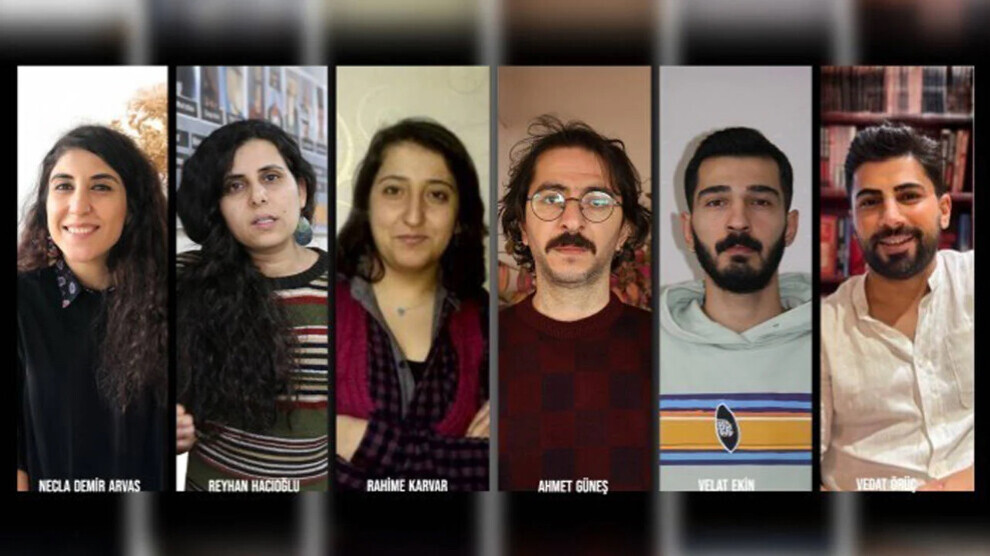The number of arrested journalists in Turkey rises to 35
With the recent detention of six more journalists, the number of imprisoned reporters in Turkey has risen to 35. The sole reason for their arrests seems to be their work.
With the recent detention of six more journalists, the number of imprisoned reporters in Turkey has risen to 35. The sole reason for their arrests seems to be their work.

Veysel Ok, co-director of the Media and Law Studies Association (MLSA), said that the detention of Kurdish journalists lacks any legal basis, and added: "The rulings of the Court of Cassation and the Constitutional Court are clear. This is a political intimidation tactic."
As part of an Istanbul-based investigation, journalists Necla Demir, Rahime Karvar, Ahmet Güneş, Velat Ekin, Vedat Örüç, and Reyhan Hacıoğlu were taken into custody on January 17 and subsequently arrested on January 20 on charges of "membership in a terrorist organization." In the past month alone, 13 journalists have been arrested. According to MLSA figures, at least 35 journalists are currently in prison in Turkey, with an additional four journalists and media workers under house arrest.
No legal justification for this practice
Veysel Ok, co-director of the MLSA, stated that the accusations are solely related to the journalistic work of the reporters. Speaking about the recent arrests, he said: "The majority of the detained journalists are Kurdish. This is the most significant factor.
Secondly, most of these journalists are freelancers working for Kurdish media outlets based in Europe, earning commissions. The accusations are directly tied to this. Essentially, the logic is: 'How dare you work for the Europe-based Kurdish media; they are considered terrorist organization publications. If you send them reports, then you must also be a member of a terrorist organization.' This reasoning has no legal basis. Journalists are not responsible for the editorial policies of newspapers or agencies. They are accountable only for their own reporting. The person responsible for the editorial policy of a newspaper or agency is the responsible director. Therefore, there is no legal basis for directing these accusations at journalists. This must be viewed entirely as a political matter."
The Turkish state does not want its human rights violations to be exposed
Veysel Ok highlighted that recent discussions in Turkish politics concerning the Kurdish question have been met with resistance from the government, which does not want these topics to be debated or existing human rights violations to gain visibility. He noted that this has translated into increased pressure on the Kurdish media. Ok stated that the government does not want these issues to be discussed or the existing human rights violations to become visible. He said, "That’s why Kurdish journalists are being targeted. However, even as they are arrested, no evidence is presented to prove their alleged membership in an organization. Were these individuals reporting under orders?
Were they following directives? None of this exists. What hierarchical structure are they supposedly part of? Without addressing any of these questions, they specifically arrest journalists working for Europe-based Kurdish media outlets."
The Constitutional Court's ruling in favor of journalist Uğur sets a precedent
Lawyer Veysel Ok pointed out that the Constitutional Court, in its decision regarding journalist Cemil Uğur, explicitly emphasized that journalists cannot be held responsible for the editorial policies of newspapers or agencies. Ok noted that the content of reports should be examined and any potential criminal elements within those reports should be identified. However, he stated that none of the recently detained journalists were questioned about the content of their reports.
The Turkish state seeks to intimidate journalists
MLSA Co-Director Veysel Ok noted that questions such as 'Did you receive payment? Did you submit reports? Are you familiar with these individuals?' were being asked during the interrogations, and added: "This is the essence of the situation. There are thousands of freelance journalists in Turkey. These individuals are no different, but because they are associated with Europe-based Kurdish media, the prosecutor deemed it sufficient to accuse them of being members of an organization. In the short term, their chances of remaining detained are high, but in the medium and long term, there is no legal basis for keeping them in prison. The rulings of the Court of Cassation and the Constitutional Court are explicit. This constitutes political intimidation. The government has increased the pressure to prevent a space for debate. Look at the current numbers: with these recent arrests, the number of detained journalists in Turkey has risen to 35, with an additional four under house arrest. These figures have not been this high since the State of Emergency in 2016."